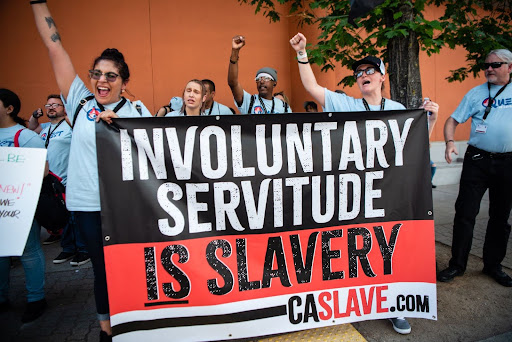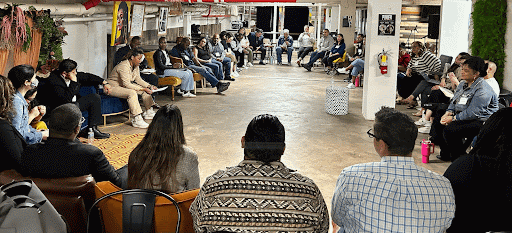What We're Reading: Funding Trans Liberation
Last year in July 2021, NCG hosted a conversation with trans women of color leaders and queer/trans funder advocates–including the Akonadi Foundation, Borealis Philanthropy, Funders for LGBTQ Issues, Horizons Foundation, and Solidaire–to highlight trans leadership and dispel myths that BIPOC trans leaders and their organizations were being adequately resourced, even in the Bay Area. Since that discussion, we have seen the national conversation turn even more hostile around bodily autonomy and sovereignty for all genders, amplified policing of trans bodies in public spaces, and an explicit attack on the existence of trans youth in State legislatures. Undoubtedly, while Republican states in the South are experiencing the sharpest edges of trans antagonism, Californians are witnessing the impacts of state-sanctioned transphobia. For instance, this June during Pride Month, a local drag queen story hour for children in San Lorenzo was stormed by cisgender men affiliated with the far-right group the Proud Boys.
What does this mean for trans communities in California? How can we leverage our access to resources to support trans organizers responding to this hostile political landscape? And how can philanthropy better understand the specific needs of trans communities and resource trans-led organizations for the long haul?
As part of a Funders for Justice political education training, Jaden Fields, Co-Director of Mirror Memoirs (based in Los Angeles on unceded Tongva Land), shared the long history of state-sanctioned criminalization and pathologization of gender variance by the medical industrial complex. From laws that forbid a person from appearing in public “in a dress not belonging to his or her sex” in 1848, to doctors performing surgical “corrections” on intersex people in the 1920s, to homosexuality listed in the first edition of the Diagnostic and Statistical Manual of Mental Disorders (DSM) under “Sociopathic Personality Disturbance” in 1952 (homosexuality was declassified as a mental health disorder in 1973). The policing of bodies, gender expressions, and sexualities is a historical fact rather than a political aberration. Fields’ analysis of this political moment requires us to contextualize what is happening from a longer time horizon because we cannot afford historical amnesia.
For decades, trans, queer, and intersex people have been sounding the alarm on the ways our bodily sovereignty has been undermined and attacked, even before the Dobbs case that overturned Roe v Wade. As the Fund for Trans Generations (FTG) and our sibling funds at Borealis Philanthropy have shared, “prioritizing queer and trans liberation in the fight for reproductive justice builds a future that serves us all.” This corollary remains true: reproductive justice is trans justice; trans justice is reproductive justice. In the face of over 300+ anti-trans bills across the States, Black, Indigenous, and trans movement leaders of color are building networks of care, creating spaces of connection and strategizing, and building new worlds that foster interdependence and collective liberation.
The Fund for Trans Generations continues to resource emerging trans-led organizations in California and nationally, with a particular focus on the US Southeast and Gulf Coast. Our role as a trans-led intermediary allows us to fund an entire movement ecosystem, moving resources under an aligned strategy in order to increase our donors' collective impact. While this has been a harrowing year, we have seen a number of increased pledges and commitments to funding trans communities–yet this is still not enough! For instance, a group of trans funders and movement leaders worked with the Grantmakers United for Trans Communities (GUTC), a project of Funders for LGBTQ Issues, to launch The Trans Futures Campaign, calling for at least $10M in new general operating support dollars to trans-led organizations for the long-haul work that is ahead. Everyone has a role to play in protecting and resourcing trans communities because, as Fannie Lou Hamer said, “nobody’s free until everyone is free.” In response to this call, we are seeing more funder partners join in our efforts, like The California Endowment and Ford Foundation.
Our Call to Action:
- Philanthropy must fund front-line trans organizers for the long-haul (as well as the short-term and middle-term).
- Philanthropy needs to fund trans-led movement-building organizations working to build power for and by trans communities.
- Philanthropy should resource the ecosystem of trans-led grassroots groups, nonprofits, and intermediaries working together and show up in alignment with us.
As we look forward to what lies ahead, I am reminded of a recent conversation with Yuan Wang, Director of Lavender Phoenix (based in San Francisco on unceded Ramaytush Ohlone Land), whose reflections ring true:
Despite violence and isolation, our members are leaning more deeply into relationships.
We’re learning to counsel each other through grief. We're practicing asking for help.
We’re learning to intervene in violence without calling on police.
It’s easy to adopt a false sense of urgency when crisis strikes.
We remember that it’s these skills—learning to care for and nurture each other—that make liberation possible.
Yes, our communities are resilient. And, how will philanthropy do its part in making liberation possible for us?
To learn more about the ways FTG grantee partners are sustaining themselves and creating politicized healing spaces for community members, join us this fall for our FTG donor learning session on Wednesday, September 21, 2022, from 1:00 pm - 3:00 pm PT. And if you’re looking to partner directly with FTG, contact Maya Berkowitz, Borealis’ Director of Development, at [email protected]. Below, you’ll find resources to help ground and expand this conversation:
What We're Reading
1. Trans Communities Are Under Attack. Here’s How Philanthropy Must Respond
Inside Philanthropy, March 10, 2022
2. As Roe v Wade is Threatened, Philanthropy Must Invest in a Future Led by Trans, Queer, and BIPOC Reproductive Justice Organizers
Borealis Philanthropy, May 6, 2022
3. The Trans Futures Funding Campaign – Leveling Up for the Long-Term
Funders for LGBTQ Issues, May 24, 2022
4. Ford Foundation doubles investment for trans organizations, makes sweeping commitments to support LGBTQ+ communities
Ford Foundation, June 2, 2022
5. San Lorenzo drag queen storytime hijacked by Proud Boys
Bay Area reporter, June 13, 2022
6. The California Endowment Pledges $1 Million to Support Transgender Community Programs
The California Endowment, July 6, 2022
Author Bio
Aldita Gallardo (she/they/ella) is an organizer, facilitator, and resource mobilizer based in Oakland, California, on unceded Ohlone Land. She serves as Program Officer for the Fund for Trans Generations, a donor collaborative at Borealis Philanthropy that resources emerging trans-led organizations in the United States. She also dedicates her time to the boards of El/La Para TransLatinas, New Seneca Village, and recently joined the Board of Directors at Funders for LGBTQ Issues. Her work is informed by her lived experiences, organizing at the intersections of racial, gender, and economic justice for over a decade, and her studies at Northwestern University.



